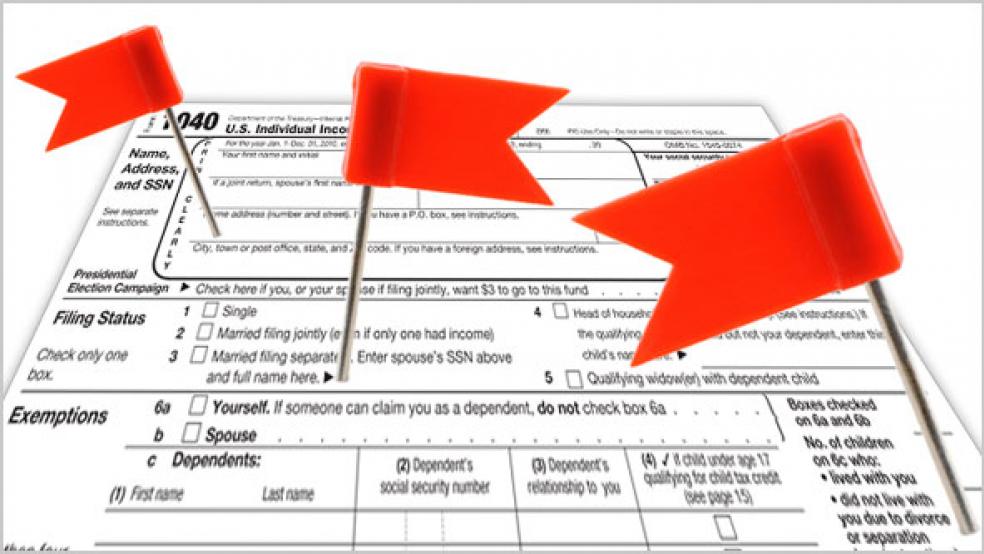There aren’t many people who like doing their taxes, but it’s even worse when you end up paying Uncle Sam more than is necessary.
Unfortunately, one in five Americans who did their own taxes paid an average of $400 to the federal government that they could have otherwise kept in their wallets because they didn’t claim certain credits or take available deductions, according to a 2014 H&R Block study.
Related: The Best and Worst States for Taxes in 2017
Don’t make the same mistake. Here are seven common tax errors to avoid this year.
1. Paying too much for tax prep: If you have simple taxes, don’t pay a professional or shell out for software to do them. About 60 million taxpayers can do their taxes with the Form 1040 EZ, which you can file for free, says Lisa Lewis, CPA and tax expert at TurboTax.
2. Not itemizing: “Only one in three taxpayers itemizes but millions more should, especially homeowners,” says Jackie Perlman, principal tax research analyst at the Tax Institute at H&R Block. “Owning a home and paying mortgage interest is often the key that unlocks itemization.”
But those with high state taxes or substantial charitable contributions may find itemizing is better than taking the standard deduction. When itemizing, taxpayers can deduct charitable donations, medical expenses, personal property taxes, real property taxes, state income or sales taxes, casualty losses, mortgage interest payments, certain mortgage insurance payments and miscellaneous expenses such as employee business expenses. “Itemizing can save taxpayers hundreds of dollars,” Perlman says.
3. Using the wrong filing status: One of the most common mistakes is entering the wrong status or number of dependents, says Perlman. While filing status may be easy for a married couple or single person, it’s trickier for a single person with dependents or who lives apart from their spouse. Can the child living in the home be claimed as a dependent, and if so, by whom? “This can be extremely complex with multi-generational households or non-traditional households,” says Perlman. “To avoid these mistakes, taxpayers can get help from a tax advisor or do some research on IRS.gov.”
Related: The Tax Credit That Lets You Double-Dip on Retirement Savings
4. Missing tax breaks: Look carefully at requirements for credits and deductions, so you don’t miss out on extra money. For instance, one in five eligible taxpayers don’t claim the Earned Income Tax Credit (EITC) for lower-income workers, says Perlman, not claiming up to $6,269. “Because eligibility can fluctuate based on financial, marital and parental changes, a taxpayer can be ineligible one year and eligible the next,” Perlman says.
5. Procrastinating: Rushing to do taxes at the last minute can mean more mistakes. For simple errors, such as inputting the wrong Social Security for a spouse or dependent, you will get a notification from the IRS to correct and your refund will be delayed. “Unfortunately, if you leave off a deduction or credit, you lose that benefit and the IRS will not call you and send you more money,” says Mark Steber, chief tax officer of Jackson Hewitt. To get that lost money, you will have to file an amended tax return.
6. Not getting organized: Similarly, if you don’t take the time to gather supporting documents, you may be leaving money on the table, says Lewis. Think about what happened last year. Did you get a new job? Or did you move for a job relocation? Expenses related to either of those scenarios can be deductible if you have the receipts. Make sure you have documents supporting charitable donations, especially large ones.
Related: Taxpayers Are Avoiding Billions in Taxes Due to Lax IRS Enforcement
7. Not filing at all. “Some people think they don’t need to file taxes because they make under IRS income threshold -- $10,350 if single and $20,700 married jointly,” says Lewis. But they could be missing out on a refund if they qualify for the Earned Income Tax Credit, which is refundable, or if they had federal taxes taken out of their paychecks during the year. “They probably will see that withholding come back to them,” Lewis says, noting that the IRS has more than $1 billion in unclaimed refunds every year, or $700 per refund.





